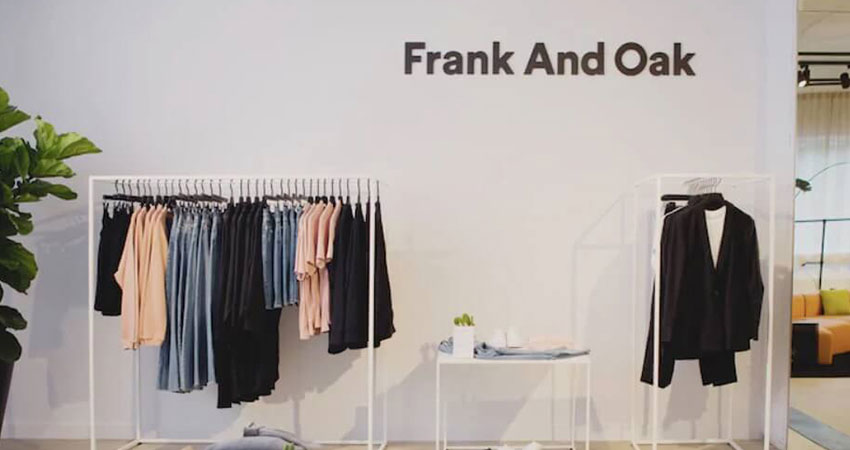A former Macy’s executive and a Wall Street veteran have teamed up to start a retail acquisition and advisory group that’s looking to build up a stable of purpose-driven brands it can help scale and grow globally, beginning with the acquisition of distressed Canadian apparel brand Frank and Oak.
Unified Commerce Group (UCG) was co-founded by Dustin Jones, a former managing director of Fung Retailing Group and an EVP and managing director of Macy’s China, both based in Hong Kong, and Greg Freihofner, formerly founder and CEO of luxury cosmetics brand Emma who has also held executive positions at Société General and Credit Suisse.
UCG is on the hunt for differentiated apparel brands it can scale and grow into other markets, with a focus on Asia as the company has offices in Hong Kong, Shanghai, Montreal and New York. Members of the advisory board, which includes former Macy’s CEO Terry Lundgren, also have Asian expertise and connections.
“The retail landscape is changing in unprecedented ways; from the pandemic to new digital and direct-to-consumer players, as well as changing lifestyles and fashion choices,” said Lundgren in a release. “Since his days at Macy’s, I’ve witnessed Dustin become a pioneer in digital retail and innovation, and forge important partnerships with global players like the Alibaba Group and the Fung Group.”
Part of the vetting and due diligence process for UCG is identifying brands it believes will resonate with consumers around the world that have similar tastes and priorities.
“We see a convergence of consumer interest, with the emergence of China as a retail force, and digitization in the U.S. sector,” said Jones, who is also CEO of UCG. “There’s been a real shift toward purpose-driven brands that aren’t just about the runways and fast fashion. Consumers have a desire to vote with their wallets on things they identify with and feel validated by.”
UCG is targeting companies in the $50 million-$250 million range that don’t have huge store fleets and are early stage enough that it can bring its operational expertise to bear without “creating complexities for brands,” he said. The plan is to add three more brands in the next year that are complementary to Frank and Oak in terms of their approach and focus.
Jones said brands have suffered from a lack of resources to expand globally, which is where UCG can help in terms of resources plus market and operational expertise. Without providing specifics, he and Jones said UCG is well capitalized and ready to pursue other targets.
“Generally, they struggle to move from their home court, and that’s where we come in,” Jones said. “We have an operations team that can add value, not just one bolted on by investors. We support their leadership to elevate the brand to a global position, with the financing to drive those initiatives. We’re in a unique position to help them achieve their broader goals.”
He said Elisabeth de Gramont, Chief Brand Officer of UCG, will be charged with elevating the brand position and global appeal of Frank and Oak and subsequent acquisitions, with emphasis on different international markets.
Jones said UGC will provide financial stability to Frank and Oak, which was $19 million in debt as of June, then work on growing and expanding the brand. The debt was restructured and eliminated as part of the acquisition, which was finalized Oct. 8.
UCG will keep all of Frank and Oak employees, and CEO Jeremy Brown will remain in place. Also, all of the company’s 19 Canadian stores will stay open.
“Their products, including elevated basics for men and women, their variety and diversity of products, we think will resonate well with consumers around the world,” said Freihofner, CFO of UCG. “There are two ways we can go – increasing the breadth of product, certainly broadening that out in their home market. At the same time, we can add breadth to their distribution to global consumers who more or less want the same things.”
He said UCG will work to solidify Frank and Oak’s base in Canada as well as in the U.S., where it does 20% of its business, and in the medium term look for opportunities to expand into Asia and other markets.
Jones said UCG sees the future of retail as placing more of an emphasis on building communities that span physical and digital, not just opening stores across cities in a new market.
“We think, where do those communities live based on the data we have on them?” he said. “How do we pursue and engage with them, approaching it community by community? We won’t say, let’s go to China and open in these five cities, or here’s the top 10 in the U.S. Let’s build community in Shanghai first and pursue that. It will create a ripple effect with an interplay across fulfillment and live engagement. That’s how we’ll prioritize our investments.”

